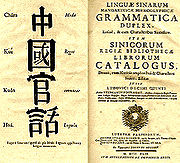
Étienne Fourmont
Encyclopedia

Oriental studies
Oriental studies is the academic field of study that embraces Near Eastern and Far Eastern societies and cultures, languages, peoples, history and archaeology; in recent years the subject has often been turned into the newer terms of Asian studies and Middle Eastern studies...
.
Born at Herblay
Herblay
Herblay is a commune in the northwestern suburbs of Paris, France. It is located from the center of Paris.-Transport:Herblay is served by Herblay station on the Transilien Paris – Saint-Lazare suburban rail line.-References:** -External links:...
near Argenteuil
Argenteuil
Argenteuil is a commune in the northwestern suburbs of Paris, France. It is located from the center of Paris. Argenteuil is a sub-prefecture of the Val-d'Oise department, the seat of the arrondissement of Argenteuil....
, he studied at the Collège Mazarin in Paris and afterwards in the Collège Montaigu where his attention was attracted to Oriental languages.
Shortly after leaving the college he published a Traduction du commentaire du Rabbin Abraham A ben Esra sur l'Ecclésiaste.
In 1711 Louis XIV
Louis XIV of France
Louis XIV , known as Louis the Great or the Sun King , was a Bourbon monarch who ruled as King of France and Navarre. His reign, from 1643 to his death in 1715, began at the age of four and lasted seventy-two years, three months, and eighteen days...
appointed Fourmont to assist a young Chinese Hoan-ji, in compiling a Chinese grammar
Chinese grammar
Standard Chinese shares a similar system of grammar with the many language varieties or dialects of the Chinese language, different from those employed by other language families, and comparable to the similar features found within the Slavic languages or Semitic languages...
. Hoan-ji died in 1716 and it was not until 1737 that Fourmont published Meditationes Sinicae and in 1742 Grammatica Sinica. He also wrote Réflexions critiques sur les histoires des anciens peuples (1735), and several dissertations printed in the Memoires of the Academy of Inscriptions.
He became professor of Arabic
Arabic language
Arabic is a name applied to the descendants of the Classical Arabic language of the 6th century AD, used most prominently in the Quran, the Islamic Holy Book...
in the Collège de France
Collège de France
The Collège de France is a higher education and research establishment located in Paris, France, in the 5th arrondissement, or Latin Quarter, across the street from the historical campus of La Sorbonne at the intersection of Rue Saint-Jacques and Rue des Écoles...
in 1715. In 1713 he was elected a member of the Academy of Inscriptions, in 1738 a member of the Royal Society of London, and in 1742 a member of that of Berlin. He died at Paris on 8 December 1745.
His brother, Michel Fourmont (1690–1746), was also a member of the Academy of Inscriptions, and professor of the Syriac language in the Royal College
Royal College
A Royal College in some Commonwealth countries is technically a college which has received permission to use the prefix Royal. Permission is usually granted through a Royal Charter. The charter normally confers a constitution with perpetual succession and the right to sue or be sued independently...
, and was sent by the government to copy inscriptions in Greece. Michel Fourmont is remembered for the destruction of ancient Sparta.
Fourmont records in 1730:
For a month now, despite illness, I have been engaged with thirty
workmen in the entire destruction of Sparta; not a day passes but I find
something, and on some I have found up to twenty inscriptions. You
understand, Monsieur, with what great joy, and with what fatigue, I
have recovered such a great quantity of marbles. . ..
If by overturning its walls and temples, if by not leaving one stone
on another in the smallest of its sacella, its place will be unknown in
the future, 1 at least have something by which to recognise it, and that
is something. I have only this means to render my voyage in the Morea
illustrious, which otherwise would have been entirely useless, which
would have suited neither France, nor me.
I am becoming a barbarian in the midst of Greece; this place is not
the abode of the Muses, ignorance has driven them out, and it is that
which makes me regret France, whither they have retreated. I should
have liked to have more time to bring them at least more than bare
nourishment, but the orders 1 have just received oblige me to finish.
Edward Dodwell on his later visit to Sparta in 1801 reported that Fourmont
was still remembered as ordering the defacement of inscriptions he had just recorded."

